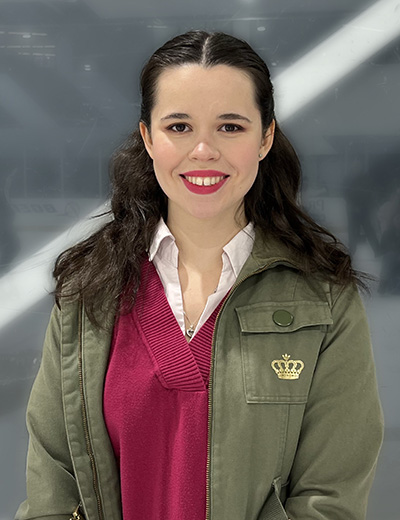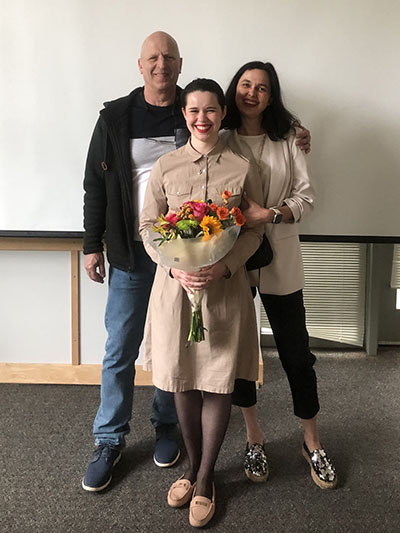Using Chemistry to Help Save Lives

Vlada Olkhovych
Clinical Technologist
As a bright student growing up in Ukraine, Vlada Olkhovych was driven to succeed by her mother, Alla.
“She was a single mother, and she didn’t have a college degree,” Vlada said. “Growing up, she always pushed me to get a good education, a good job, to have a better life than she had. She was a big inspiration for me.”
When it came time to pick an undergraduate major at V. N. Karazin Kharkiv National University, Vlada chose chemistry. A curious person, she loved how broad the subject was, and how it kept her options open for future careers.
“I just wanted to learn as much as possible about the world around me, and chemistry sits at the intersection of all the sciences,” she noted. “I didn't want to limit my career options just yet. With chemistry, you can work in basically any industry that produces something — food science, pharmaceuticals, aerospace and more.”
Vlada’s journey eventually led her to the United States, where she enrolled in the UW Master of Science in Applied Chemical Science & Technology program. In this Q&A, she explains how her experience in the program paved the way to a dream job: helping to create hope for people with cancer at Fred Hutchinson Cancer Center in Seattle.

Why did you choose this program for your master’s degree?
My mom and I were able to move to the United States in early 2021, to join my stepdad in Olympia. I researched graduate programs in chemistry, and the UW was the highest rated and most prestigious that I found. I also really liked that the program focused on applied chemistry and technology. It's oriented to state-of-the-art chemistry and what’s actually happening in industry and research today.
You must have been in the middle of getting your master’s when the war broke out in Ukraine [in February 2022]. How did that impact you?
Yes, I was just starting my second year. It was very hard — Kharkiv is close to the Russian border and the occupied states of Ukraine, and it got hit pretty bad in the fighting. A lot of my friends and family there were affected; some had to relocate, some stayed, and others joined the army to serve their country. Their resilience and courage during these hard times inspires me to be a better person — I work hard to make them proud and show that I appreciate the opportunities that were given to me.
I ended up taking an incomplete for winter quarter. My professors really helped me out during that time, but they also made sure that I could make up the work and still cover all the material. I took a few months to myself, just to work on my mental health. The school insurance helped with that. I was already a member of Robert Synovec’s research group, and he was very supportive and would always take the time to talk with me and to help me out in every way he could. I felt very supported by our program.
How did your experience in that research group impact your learning?
I chose the Synovec Lab because he was working with chromatography. When I first attended his class, he would invite his Ph.D. students to come and show us the research they were doing. It really fired up my interest in that discipline.
My group worked primarily with gas chromatography — some food chemistry, some fuels, some ecological research. We also did a lot of computational chemistry, which was very interesting. That's how I learned how to code, which was a new tool for me. I ended up using it extensively in my research, and it was really cool.
Did any of your other courses stand out?
I loved my class in microfluidics. The professor made it so interesting and useful; everything we learned was heavily integrated into the current state of research and industry. It was one of the first classes I took, so I was still learning English while learning chemistry, and it was difficult. But the professor stayed as long as it took after class to explain things and answer all my questions. The same with every other professor I interacted with — everyone was so passionate about their subjects.
How did your master’s degree help you land your current job?
Graduating from the master’s program was key to getting this job. I made a connection with Fred Hutchinson Cancer Center through Professor Synovec, and there were already a few people working there from the program. And what I was doing in my research lab at UW was directly connected to the work they do at the center, so I could show that I had the right experience. It really made me stand out as an applicant.
Tell us about the work you do.
Today, I’m a clinical technologist in a pharmacokinetics laboratory at Fred Hutch. The main focus of our work is performing therapeutic drug monitoring for a drug called busulfan, which helps condition patients before a bone marrow transplant. We also offer pharmacogenomic analysis and research new drugs used in bone marrow transplantation.
We do a lot of lab work, working with gas chromatographers and liquid chromatographers, and we do a lot of graphing and modeling on computers. We also directly communicate with doctors, talking about drug interactions and potential issues that could lead to certain variations in the data that we see.
I’m always very proud when I tell people where I work, because we’re helping people. Working on cures for cancer makes every day incredibly diverse and fulfilling.